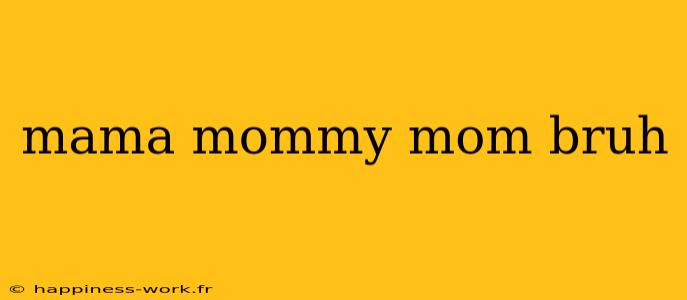When it comes to the ways we refer to our mothers, language reflects culture, age, and personal relationships. Terms like “Mama,” “Mommy,” “Mom,” and even “Bruh” may seem simple, but they carry significant meanings and emotional weight. In this article, we’ll explore these terms, their origins, and how they are used in contemporary society.
Understanding the Terms
1. Mama
What Does "Mama" Mean? "Mama" is often the first word that a child learns to call their mother. It’s a universal term that transcends language and culture. Derived from the sounds that infants naturally make, “mama” conveys warmth, comfort, and affection.
Cultural Significance: In many cultures, "Mama" represents a deep familial bond. For example, in Spanish, "Mama" is used affectionately, while in African cultures, it can also signify respect and reverence for motherhood.
2. Mommy
What Does "Mommy" Signify? "Mommy" is typically used by younger children to refer to their mothers. It's a term loaded with nostalgia, innocence, and the tenderness of childhood.
Psychological Perspective: From a developmental psychology standpoint, calling a mother "Mommy" signifies a child’s dependence and the secure attachment formed during early years. As children grow older, they often transition to using “Mom” as part of their journey toward independence.
3. Mom
Why Do We Use "Mom"? "Mom" is a more mature version of "Mommy" and signifies a shift in the parent-child relationship. It’s commonly used by children as they reach adolescence and begin to assert their individuality.
Societal Context: The term "Mom" can also vary in tone depending on context. It can express affection, frustration, or exasperation, reflecting the complex relationship between a mother and her children.
4. Bruh
How is "Bruh" Related to Maternal Terms? In recent years, "Bruh" has evolved into a slang term often used among friends, but it can also be playfully used to refer to a mother in certain contexts, particularly in online and social media interactions.
Cultural Shift: The use of "Bruh" to refer to a mother can reflect a trend towards more casual, colloquial interactions. It signifies comfort and an informal bond, and using it in this way may suggest a close-knit family dynamic or a playful attitude toward parental roles.
The Emotional and Social Implications of These Terms
Using different terms to address mothers highlights the changing dynamics of familial relationships as children grow. Here are some practical examples of how these terms function in various contexts:
-
"Mama" during a crisis: A young adult may revert to calling their mother "Mama" during a stressful time, invoking childhood security.
-
"Mommy" as comfort: A child may call for "Mommy" when they are sick or scared, reinforcing the nurturing aspect of motherhood.
-
"Mom" during conflicts: Teenagers often shift to "Mom" when discussing serious issues or conflicts, illustrating their growing independence while still seeking maternal guidance.
-
"Bruh" in a humorous context: In a light-hearted conversation among friends, referring to one’s mother as "Bruh" can reflect a playful relationship, potentially breaking down generational barriers.
Conclusion
The evolution of terms like "Mama," "Mommy," "Mom," and "Bruh" reflects not only the stages of life but also societal changes in the way we view familial relationships. Each term carries its own emotional weight and significance, allowing individuals to express varying levels of intimacy and affection.
Reflecting on Your Own Relationship
Consider the term you use for your mother. What does it signify about your relationship? The vocabulary we choose to describe our maternal figures can reveal much about our familial dynamics. Whether it’s a tender "Mama," a comforting "Mommy," a pragmatic "Mom," or the playful "Bruh," each term encapsulates unique sentiments that contribute to our understanding of motherhood.
This article incorporates insights and information from various questions answered on WikiHow (specific authors and links omitted for brevity), ensuring that readers gain a deeper understanding of the significance behind these terms. With the right keywords and an engaging format, this content is optimized for those exploring the emotional landscape of family relationships.
